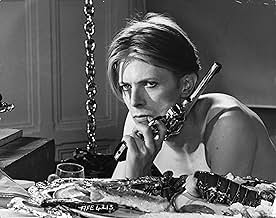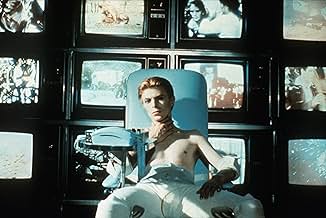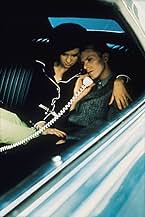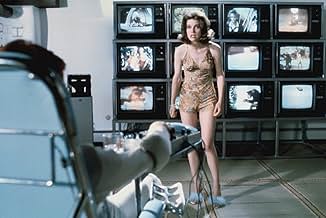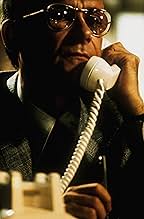AVALIAÇÃO DA IMDb
6,6/10
30 mil
SUA AVALIAÇÃO
Um alienígena deve fingir ser humano para salvar seu planeta moribundo, mas uma mulher e alguns homens criam complicações.Um alienígena deve fingir ser humano para salvar seu planeta moribundo, mas uma mulher e alguns homens criam complicações.Um alienígena deve fingir ser humano para salvar seu planeta moribundo, mas uma mulher e alguns homens criam complicações.
- Prêmios
- 1 vitória e 4 indicações no total
Jim Lovell
- Capt. James Lovell, Commander of Apollo 13
- (as Capt. James Lovell)
Dort Clark
- Waiter
- (não creditado)
- Direção
- Roteiristas
- Elenco e equipe completos
- Produção, bilheteria e muito mais no IMDbPro
Avaliações em destaque
The Man Who Fell To Earth is ultimately a frustrating film. The phrase 'the sum of its parts is greater than the whole' definitely applies. At times it's brilliant and original, but it's effectively brought down by its overlong running time and relentlessly obtuse presentation. It begins very promisingly but falls away in the final third, where it just loses focus and direction. Visually, as can be expected from Nicolas Roeg, it's often quite excellent, with his usual bold editing techniques in place too. The cinematography is very good and David Bowie certainly looks the part. Roeg certainly had a thing for using singers in lead roles. He also utilized Mick Jagger in Performance and Art Garfunkel in Bad Timing, and Bowie like those other two is used to good effect. He doesn't really need to act very much; Bowie in the mid 70's was an almost alien-like creature to begin with. I thought Candy Clark was very good as Mary-Lou. She brought some warmth to the proceedings which was appreciated.
Like Roeg's work in general, there is hardly any humour here. He was primarily a visionary auteur and The Man Who Fell To Earth is undoubtedly a work that allows him to express himself in a highly personal way. But unlike in Performance, Walkabout, Don't Look Now and even Bad Timing the technique never seemed to achieve an overall whole. My feeling is that I would need to re-watch this movie in order to develop a better appreciation of it. On first impressions, it's a collection of great moments within an impenetrable whole. A very strange film though.
Like Roeg's work in general, there is hardly any humour here. He was primarily a visionary auteur and The Man Who Fell To Earth is undoubtedly a work that allows him to express himself in a highly personal way. But unlike in Performance, Walkabout, Don't Look Now and even Bad Timing the technique never seemed to achieve an overall whole. My feeling is that I would need to re-watch this movie in order to develop a better appreciation of it. On first impressions, it's a collection of great moments within an impenetrable whole. A very strange film though.
so, it seems to me there have been a lot of negative reviews. they break down into two categories: 1) those that say its got "too much sex". blah. grow up. 2) those who say "it's a mess". okay...we can work with that.
this really isnt a plot-based scifi like Star Wars. its not about linear events with obvious cause-and-effects, good guys and bad. its part scifi, part art film, and part trippy 70s movie. these movies dont speak with dialogue, they speak with images, and with mood (ie, "How does this sequence make you feel?" warm? uncomfortable? etc) thats just what this movie is. if you dont like these types of movies--movies in which you may have to do some interpretation--you wont like this one either. simple. its not Star Wars, people...Lucas isnt here to hold your hand.
for instance, one of the "gratuitous" sex scenes near the end, after Mary Lou has aged, was not gratuitous but in fact grotesque. it made me uncomfortable. which i am certain is exactly what it was supposed to do--to show me what a sham Newton's relationship with Mary Lou had become. it had become merely a drunken-memory, for them both... and their sex-scene-revisited depicted that, perfectly.
the whole movie is like that, speaking in general feelings and mood rather than black-and-white dialogue. and its more powerful because of it.
so...put it in perspective as you critic it. dont like romantic comedies? then youre not gonna like the latest Hugh Grant film. but that doesnt mean it isnt good. capese? (btw, i think hugh grant movies suck).
this really isnt a plot-based scifi like Star Wars. its not about linear events with obvious cause-and-effects, good guys and bad. its part scifi, part art film, and part trippy 70s movie. these movies dont speak with dialogue, they speak with images, and with mood (ie, "How does this sequence make you feel?" warm? uncomfortable? etc) thats just what this movie is. if you dont like these types of movies--movies in which you may have to do some interpretation--you wont like this one either. simple. its not Star Wars, people...Lucas isnt here to hold your hand.
for instance, one of the "gratuitous" sex scenes near the end, after Mary Lou has aged, was not gratuitous but in fact grotesque. it made me uncomfortable. which i am certain is exactly what it was supposed to do--to show me what a sham Newton's relationship with Mary Lou had become. it had become merely a drunken-memory, for them both... and their sex-scene-revisited depicted that, perfectly.
the whole movie is like that, speaking in general feelings and mood rather than black-and-white dialogue. and its more powerful because of it.
so...put it in perspective as you critic it. dont like romantic comedies? then youre not gonna like the latest Hugh Grant film. but that doesnt mean it isnt good. capese? (btw, i think hugh grant movies suck).
Nicholas Roeg is a little tricky at times when it comes to narrative. Sometimes he experiments with it excellently (Bad Timing), and other times he slightly dulls the senses in an experimental kind of way (Dont Look Now). The Man Who Fell to Earth seems to be told mostly in a linear fashion, and there seems to be something of a story going on, but... I never felt it completely click. Maybe that is part of Roeg's point with the material, to create a kind of alienation that the alien, no pun intended, feels whilst gathering up the billions he needs to get supplies back to his home planet. But something just doesn't feel like it goes the way it should, even when things are fascinating in a scene, maybe even brilliant, and the actors do end up trying their best along with Roeg's knack at capturing a mood in a specific, strange but bewildering way.
It isn't totally clear where the plot could be headed, aside from the usual oblivion of the protagonist to the wretched TV, excess of alcohol, and some drugs to boot. Which is fine as a route of a plot. But it's perhaps that there doesn't seem to be a sharper satirical stabbing motion being made in the context of the story, of what Bowie's "man" is doing on Earth, except in bits and pieces. Perhaps he's a reflection of how some of us act right here on our planet, or that there's even a sorrow to the state of affairs with Thomas Newton, who is sensitive, sometimes weak, and at least a little unnerving in his detachment via the almighty dollar. Maybe there are some valid points made in connection with the suffering of a human being, in what it does to his soul the longer they're on some strange planet, by way of a horrible and dehumanizing marketplace. But the way it's presented, to once again pop up a word that gets tossed like a beach ball at a concert, in a pretentious manner.
Or, to amend that with another tired cliché: the parts are better than the sum or the whole. I did enjoy very much just looking at the Man Who Fell to Earth, with some scenes, some shots, some transitions, some jabs at "real" cinema, displaying Roeg's natural gifts as an auteur at the peak of his powers. Just seeing that New York skyline, for instance, is a minor thrill, or in the cutbacks Newton has to his old world. Hell, even the sex scenes, much lauded in some of the more negative reviews, have a certain messy charm to them. And who doesn't love seeing Rip Torn as some smart but dangerous scientist who moves on from a penchant for young students in the sack to Newton's possible rocket-ship? Seeing scenes with Bowie and Rip Torn are, indeed, exciting in their indescribable link (Bowie, of course, so fits into Newton it's hard to figure anyone else in the part). I even loved the quirky, old rock and roll/jazz type of music Roeg used, when the first assumption would be Bowie would glam-rock the whole place up.
If there's anything that keeps the Man Who Fell to Earth from being a truly spectacular cult item though, if only for this reviewer, it's a certain mood overall to the piece, an uncertainty as to what to do with everything in the book and how to make it so unusual a piece of science fiction that its own alienation could potentially affect the viewer in unexpected ways. It's got guts to go where it does, to be sure, but it's a tough journey along the way, with romance, wonderment of the unknown, mental deconstruction, and corporate fables all entwined. Whatever you have to say about it there's nothing else like it.
It isn't totally clear where the plot could be headed, aside from the usual oblivion of the protagonist to the wretched TV, excess of alcohol, and some drugs to boot. Which is fine as a route of a plot. But it's perhaps that there doesn't seem to be a sharper satirical stabbing motion being made in the context of the story, of what Bowie's "man" is doing on Earth, except in bits and pieces. Perhaps he's a reflection of how some of us act right here on our planet, or that there's even a sorrow to the state of affairs with Thomas Newton, who is sensitive, sometimes weak, and at least a little unnerving in his detachment via the almighty dollar. Maybe there are some valid points made in connection with the suffering of a human being, in what it does to his soul the longer they're on some strange planet, by way of a horrible and dehumanizing marketplace. But the way it's presented, to once again pop up a word that gets tossed like a beach ball at a concert, in a pretentious manner.
Or, to amend that with another tired cliché: the parts are better than the sum or the whole. I did enjoy very much just looking at the Man Who Fell to Earth, with some scenes, some shots, some transitions, some jabs at "real" cinema, displaying Roeg's natural gifts as an auteur at the peak of his powers. Just seeing that New York skyline, for instance, is a minor thrill, or in the cutbacks Newton has to his old world. Hell, even the sex scenes, much lauded in some of the more negative reviews, have a certain messy charm to them. And who doesn't love seeing Rip Torn as some smart but dangerous scientist who moves on from a penchant for young students in the sack to Newton's possible rocket-ship? Seeing scenes with Bowie and Rip Torn are, indeed, exciting in their indescribable link (Bowie, of course, so fits into Newton it's hard to figure anyone else in the part). I even loved the quirky, old rock and roll/jazz type of music Roeg used, when the first assumption would be Bowie would glam-rock the whole place up.
If there's anything that keeps the Man Who Fell to Earth from being a truly spectacular cult item though, if only for this reviewer, it's a certain mood overall to the piece, an uncertainty as to what to do with everything in the book and how to make it so unusual a piece of science fiction that its own alienation could potentially affect the viewer in unexpected ways. It's got guts to go where it does, to be sure, but it's a tough journey along the way, with romance, wonderment of the unknown, mental deconstruction, and corporate fables all entwined. Whatever you have to say about it there's nothing else like it.
Nicholas Roeg is a maverick filmmaker and The man who fell to Earth is one of the many reasons why. Bowie is an alien who lands on earth in search of water. This was the legendary singer's first starring role and he more than owns the role of a strange human trying to mix with humans. The surreal imagery by noted director Nicholas Roeg is a highlight and although the film wasn't a big hit either critically or commercially back when it was released, it has a huge following today. If you are a fan of science fiction you should check this out. 7/10 (Surreal galore in this sci-fi).
I have just watched "The Man Who Fell to Earth" from beginning to end after seeing several scenes here and there from years of flipping past the sci-fi channel or whatever other channel this film might've been shown on. I must say that I think it is one of the most interesting films I've ever seen. Now before you start thinking this is going to be a review of blind worship, stop for a moment and remember that just because something is interesting doesn't mean it's likeable. Art is not meant to be appealing. It's meant to cause a reaction, it's meant to make you think, it's meant to make you uncomfortable. Art forces feelings upon you that you might rather not experience, so whether you like it or not, this film is a work of art. But some art...in fact a lot of art...is trash. Is this movie trash? Some say yes, some say not. Some think it's brilliant, others think it a waste of time. Some think the narrative's dependence on visual stimulus as opposed to linear storytelling is a touch of cinematic beauty, while others dismiss it as experimental tripe.
Somebody wrote a scathing review saying that if you like junk like "Lost Highway," you might enjoy this movie. Well, no offense meant, but I'd like to say that this person has made clear that he can't see past what's appealing. Why watch something that's unappealing you might ask? Because that's what art's supposed to do...it challenges you and your values. Sometimes it reinforces them, and sometimes it will blatantly attack them. You have to draw your own conclusions and interpretations. "The Man Who Fell to Earth" is no different. Yes, the film seems to jump from time to time, one scene juxtaposed with a scene that takes place 20 years later, a flashback that may or may not be a flashback, it is confusing. I know I was confused. It's not a linear narrative...it's telling a story through pictures, with occasional words just to make sure you have a little more than an inkling as to what you're supposed to be seeing. Personally, I would be interested to see the movie without dialogue...like "Aeon Flux," a story can be told philosophically and artistically without words.
What is the story? Well...quite simply, David Bowie, in his first and probably one of his best on-screen performances, is an alien on Earth trying to find a way to get water back to his world. Is it as simple as it sounds? Not by any means. But you have to believe it to see it. You will be confused, you might even be offended (there's a lot of sexually explicit scenes that border on pornography), but one way or the other, this film is meant to be visually stimulating. What you see will make you think...if you're repulsed by it and feel the urge to turn it off, then it's simply not your kind of movie.
On the whole, I like this movie, though I must be in a certain mood to watch it. It is not easy to watch, there are long stretches without dialogue, and when there is dialogue, it's often confusing. But no matter what, I like what I was seeing on the screen. I do feel like watching it again because I know there is more to absorb and take in, there's more to think about that I missed before. But that's the kind of person I am...I want to think, and I want that discomfort this movie gives me because I am alleviated by the need to solve it, not dismiss it. Bowie is in fine form, probably used to alienation being a Brit in America, and having played his own Ziggy Stardust character in the past. The rest of the cast performs rather competently, although nobody's performance shines as much as Bowie's (although Candy Clarke is pretty good in some scenes, and Rip Torn's deadpan performance is a bit of dry humor).
Dispute me if you must, I give this movie ***1/2 out of ****.
Somebody wrote a scathing review saying that if you like junk like "Lost Highway," you might enjoy this movie. Well, no offense meant, but I'd like to say that this person has made clear that he can't see past what's appealing. Why watch something that's unappealing you might ask? Because that's what art's supposed to do...it challenges you and your values. Sometimes it reinforces them, and sometimes it will blatantly attack them. You have to draw your own conclusions and interpretations. "The Man Who Fell to Earth" is no different. Yes, the film seems to jump from time to time, one scene juxtaposed with a scene that takes place 20 years later, a flashback that may or may not be a flashback, it is confusing. I know I was confused. It's not a linear narrative...it's telling a story through pictures, with occasional words just to make sure you have a little more than an inkling as to what you're supposed to be seeing. Personally, I would be interested to see the movie without dialogue...like "Aeon Flux," a story can be told philosophically and artistically without words.
What is the story? Well...quite simply, David Bowie, in his first and probably one of his best on-screen performances, is an alien on Earth trying to find a way to get water back to his world. Is it as simple as it sounds? Not by any means. But you have to believe it to see it. You will be confused, you might even be offended (there's a lot of sexually explicit scenes that border on pornography), but one way or the other, this film is meant to be visually stimulating. What you see will make you think...if you're repulsed by it and feel the urge to turn it off, then it's simply not your kind of movie.
On the whole, I like this movie, though I must be in a certain mood to watch it. It is not easy to watch, there are long stretches without dialogue, and when there is dialogue, it's often confusing. But no matter what, I like what I was seeing on the screen. I do feel like watching it again because I know there is more to absorb and take in, there's more to think about that I missed before. But that's the kind of person I am...I want to think, and I want that discomfort this movie gives me because I am alleviated by the need to solve it, not dismiss it. Bowie is in fine form, probably used to alienation being a Brit in America, and having played his own Ziggy Stardust character in the past. The rest of the cast performs rather competently, although nobody's performance shines as much as Bowie's (although Candy Clarke is pretty good in some scenes, and Rip Torn's deadpan performance is a bit of dry humor).
Dispute me if you must, I give this movie ***1/2 out of ****.
Você sabia?
- CuriosidadesThe picture was temporarily scored with music from Pink Floyd's album "The Dark Side of the Moon".
- Erros de gravaçãoWhen Mary-Lou takes Thomas to the hotel's fifth floor in the elevator instead of allowing him to use the stairs, she says, "It's five flights." This would be correct in the UK, but not in America; from the ground floor to the fifth floor of an American building is four flights.
- Citações
Thomas Jerome Newton: Ask me...
Nathan Bryce: What?
Thomas Jerome Newton: The question you've been wanting to ask ever since we met.
Nathan Bryce: Are you Lithuanian?
Thomas Jerome Newton: [grins] I come from England.
Nathan Bryce: Ah, that's not so terrible.
- Versões alternativasThe US theatrical release of the film was drastically altered. Not only were 20 minutes cut (including the gun sequence) but some scenes were rearranged and a few scenes had different camera angles.
- ConexõesEdited into We are the Robots (2010)
Principais escolhas
Faça login para avaliar e ver a lista de recomendações personalizadas
- How long is The Man Who Fell to Earth?Fornecido pela Alexa
Detalhes
- Data de lançamento
- País de origem
- Idioma
- Também conhecido como
- El hombre que cayó a la Tierra
- Locações de filme
- Empresas de produção
- Consulte mais créditos da empresa na IMDbPro
Bilheteria
- Orçamento
- US$ 1.500.000 (estimativa)
- Faturamento bruto nos EUA e Canadá
- US$ 100.072
- Fim de semana de estreia nos EUA e Canadá
- US$ 5.922
- 26 de jun. de 2011
- Faturamento bruto mundial
- US$ 167.072
- Tempo de duração
- 2 h 19 min(139 min)
- Cor
- Mixagem de som
- Proporção
- 2.35 : 1
Contribua para esta página
Sugerir uma alteração ou adicionar conteúdo ausente




